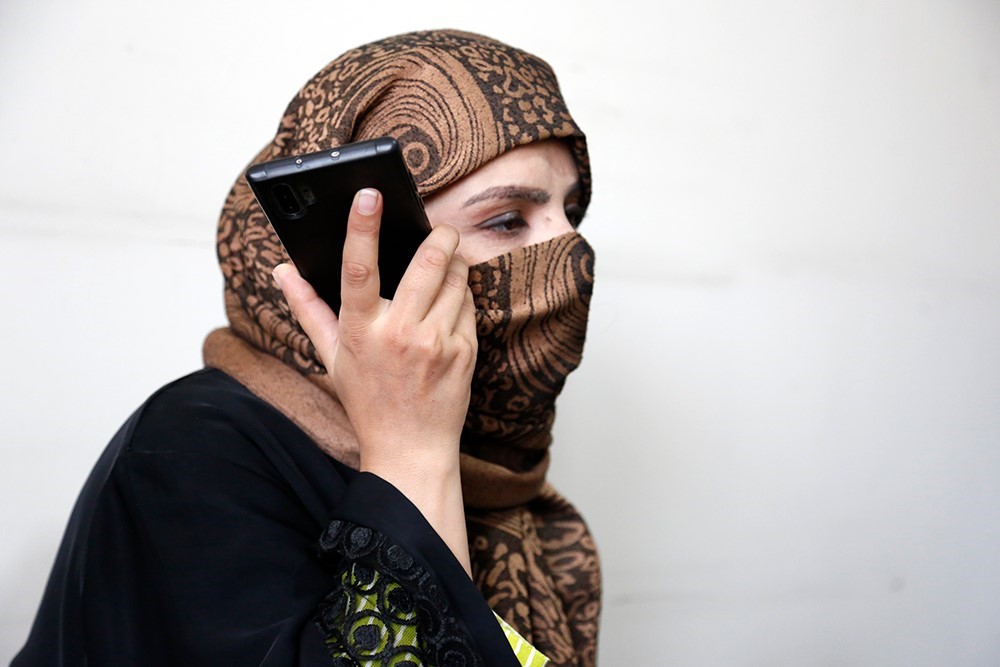Kabul, Afghanistan – While visiting the Ahmad Shah Baba District Hospital in Kabul, Shafiqua Sadat met a Jhpiego-trained midwife who connected her to a service that would become beneficial for both her and her soon-to-be born baby girl.
Shafiqua, 26 and visibly pregnant, had been keeping her sister-in-law company when midwife Rozina Sahak approached the pair to tell them about a mobile phone service that delivers free and confidential post-birth care messages to new mothers.
Shafiqua registered her family phone number and, soon after giving birth to her daughter, Khadija, she started receiving health tips from “Dr. Malalai,” a virtual caregiver who explained the benefits of exclusive breastfeeding for mom and baby and addressed common problems women face following the birth of a child.
“For the first time in my life, I understood the importance of exclusive breastfeeding,” said Shafiqua, adding that she found the information “incredibly valuable.”

With partner Viamo, Jhpiego initiated the mobile phone messaging service for women in Afghanistan in response to disrupted health services and travel restrictions. This innovative solution aims to support women who are either pregnant or postpartum to access and engage with content that promotes self-care behaviors. After they register, the platform will automatically call them each week and the women can select the content they are most interested in.
The need for self-care is real. Just 66 percent of women in Afghanistan gave birth at a health care facility and only 36 percent received postnatal care within two days of birth. Equally concerning is the fact that only one-third of pregnant women in Afghanistan completed all four recommended antenatal visits, UNICEF reports. And just over one-half of mothers in Afghanistan practice exclusive breastfeeding, according to the World Bank, even though it’s proven to be one of the most effective ways to ensure a baby’s health and survival.
Increasingly tight restrictions on Afghan women’s education, employment and freedom of movement followed an August 2021 change in government. This makes a self-care initiative, as defined by the World Health Organization, all the more vital for connecting women like Shafiqua to lifesaving care for themselves and their families.
In 2022, Jhpiego and Viamo launched the mobile phone info line that features interactive voice recordings in Dari and Pashto through the persona of Dr. Malalai, whose tone is that of a loving older sister. The messages delivered during the first postpartum week focus on nutrition, hygiene, exclusive breastfeeding, pain management and wound care. Subsequent messages discuss family planning and immunization.
Self-care champions working in 32 health facilities across Kabul have been spreading the news to mothers about the info line, which counters misinformation and encourages women’s participation in evidence-based interventions.
With support from the U.S. Agency for International Development (USAID) under the Jhpiego-led Urban Health Initiative, the scope of the info line has expanded this year to include messages for pregnant women.
Shafiqua hopes that many more pregnant women and mothers in her country will have access to this vital resource, just like she did. “Exclusive breastfeeding was really beneficial for my daughter, who is seven months now. She didn’t have any major health problems and grew well compared to my two-year-old, Abidullah,” she said of her son.
The crucial information they provide is a lifeline for mothers like me.”
Shafiqua Sadat
Dr. Pir Mohammad Paya, a physician and senior program manager in Jhpiego’s Baltimore office, reviewed this story for technical accuracy.
Rahmat Nabi is a communications manager in Jhpiego’s office in Kabul.




